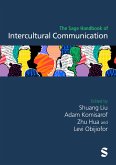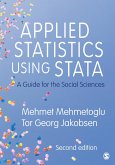The Sage Handbook of Intercultural Communication (eBook, ePUB)
Redaktion: Liu, Shuang; Obijiofor, Levi; Hua, Zhu; Komisarof, Adam
89,95 €
89,95 €
inkl. MwSt.
Sofort per Download lieferbar

45 °P sammeln
89,95 €
Als Download kaufen

89,95 €
inkl. MwSt.
Sofort per Download lieferbar

45 °P sammeln
Jetzt verschenken
Alle Infos zum eBook verschenken
89,95 €
inkl. MwSt.
Sofort per Download lieferbar
Alle Infos zum eBook verschenken

45 °P sammeln
The Sage Handbook of Intercultural Communication (eBook, ePUB)
Redaktion: Liu, Shuang; Obijiofor, Levi; Hua, Zhu; Komisarof, Adam
- Format: ePub
- Merkliste
- Auf die Merkliste
- Bewerten Bewerten
- Teilen
- Produkt teilen
- Produkterinnerung
- Produkterinnerung

Bitte loggen Sie sich zunächst in Ihr Kundenkonto ein oder registrieren Sie sich bei
bücher.de, um das eBook-Abo tolino select nutzen zu können.
Hier können Sie sich einloggen
Hier können Sie sich einloggen
Sie sind bereits eingeloggt. Klicken Sie auf 2. tolino select Abo, um fortzufahren.

Bitte loggen Sie sich zunächst in Ihr Kundenkonto ein oder registrieren Sie sich bei bücher.de, um das eBook-Abo tolino select nutzen zu können.
A cutting-edge exploration of contemporary intercultural communication, with a focus on context and practice.
- Geräte: eReader
- mit Kopierschutz
- eBook Hilfe
- Größe: 7.82MB
Andere Kunden interessierten sich auch für
![The Sage Handbook of Intercultural Communication (eBook, PDF) The Sage Handbook of Intercultural Communication (eBook, PDF)]() The Sage Handbook of Intercultural Communication (eBook, PDF)89,95 €
The Sage Handbook of Intercultural Communication (eBook, PDF)89,95 €![The SAGE Handbook of Qualitative Research Design (eBook, ePUB) The SAGE Handbook of Qualitative Research Design (eBook, ePUB)]() The SAGE Handbook of Qualitative Research Design (eBook, ePUB)196,95 €
The SAGE Handbook of Qualitative Research Design (eBook, ePUB)196,95 €![The SAGE Handbook of Participatory Research and Inquiry (eBook, ePUB) The SAGE Handbook of Participatory Research and Inquiry (eBook, ePUB)]() The SAGE Handbook of Participatory Research and Inquiry (eBook, ePUB)216,95 €
The SAGE Handbook of Participatory Research and Inquiry (eBook, ePUB)216,95 €![The SAGE Handbook of Participatory Research and Inquiry (eBook, ePUB) The SAGE Handbook of Participatory Research and Inquiry (eBook, ePUB)]() The SAGE Handbook of Participatory Research and Inquiry (eBook, ePUB)216,95 €
The SAGE Handbook of Participatory Research and Inquiry (eBook, ePUB)216,95 €![The SAGE Handbook of Qualitative Research Design (eBook, ePUB) The SAGE Handbook of Qualitative Research Design (eBook, ePUB)]() The SAGE Handbook of Qualitative Research Design (eBook, ePUB)196,95 €
The SAGE Handbook of Qualitative Research Design (eBook, ePUB)196,95 €![Intercultural Communication for the Global Business Professional (eBook, ePUB) Intercultural Communication for the Global Business Professional (eBook, ePUB)]() Intercultural Communication for the Global Business Professional (eBook, ePUB)38,95 €
Intercultural Communication for the Global Business Professional (eBook, ePUB)38,95 €![Applied Statistics Using Stata (eBook, ePUB) Applied Statistics Using Stata (eBook, ePUB)]() Mehmet MehmetogluApplied Statistics Using Stata (eBook, ePUB)43,95 €
Mehmet MehmetogluApplied Statistics Using Stata (eBook, ePUB)43,95 €-
-
-
A cutting-edge exploration of contemporary intercultural communication, with a focus on context and practice.
Dieser Download kann aus rechtlichen Gründen nur mit Rechnungsadresse in A, D ausgeliefert werden.
Produktdetails
- Produktdetails
- Verlag: SAGE Publications
- Erscheinungstermin: 16. Januar 2025
- Englisch
- ISBN-13: 9781036202453
- Artikelnr.: 72249058
- Verlag: SAGE Publications
- Erscheinungstermin: 16. Januar 2025
- Englisch
- ISBN-13: 9781036202453
- Artikelnr.: 72249058
- Herstellerkennzeichnung Die Herstellerinformationen sind derzeit nicht verfügbar.
Shuang Liu is Associate Professor in the School of Communication and Arts at the University of Queensland, Australia. She is an internationally recognised intercultural communication expert, specialising in the areas of immigration, acculturation, identity negotiation, particularly in relation to older migrants ageing in a foreign land. Adam Komisarof is Professor of Intercultural Communication and Acculturation Psychology in Keio University′s Faculty of Letters in Tokyo. Previously, he published 3 books, most recently Crossing Boundaries and Weaving Intercultural Work, Life, and Scholarship in Globalizing Universities (Routledge, with Zhu Hua), as well as numerous journal articles and chapters in publications such as International Journal of Intercultural Relations, Asian Journal of Social Psychology, and Cambridge Handbook of Acculturation Psychology (2nd edition). He has twice been a Visiting Academic at the University of Oxford (2012-13, 2022-23). Adam is a Fellow and former President of the International Academy for Intercultural Research (2021-23). Zhu Hua is a Professor of Language Learning and Intercultural Communication and the Director of the International Centre for Intercultural Studies at IOE, UCL's Faculty of Education and Society. She is also the Chair of the British Association for Applied Linguistics (2021-2024), an elected Fellow of the Academy of Social Sciences, UK, and an elected Fellow of the International Academy for Intercultural Research. Prior to joining IOE, Zhu Hua was the Chair of Educational Linguistics and Director of the Mosaic Group for Research on Multilingualism and Director of Internationalisation at the School of Education, University of Birmingham (2020-2021). She also served as a Professor of Applied Linguistics and Communication at Birkbeck College, University of London (2007-2020) and held the positions of Head of Department and Assistant Dean in the School of Social Sciences, History and Philosophy at Birkbeck College, University of London (2014-2020). Levi Obijiofor is an Associate Professor of Journalism in the School of Communication and Arts at University of Queensland. He is an expert in comparative journalism examining journalistic practices in Western and non-Western contexts. This has led to international recognition of his contributions to the field. He is a leading scholar in Development Communication. His work provides fresh, innovative, and practical insights into emerging issues in the field. His publications include numerous peer-reviewed journal articles, book chapters, and three monographs. He undertakes regular research consultancies for international organisations such as UNESCO, Open Professional School (New York), and the UNDP.
Introduction: Intercultural communication in contexts - Shuang Liu, Adam
Komisarof, Zhu Hua, and Levi Obijiofor
Part 1: Theoretical and methodological development of the field
Chapter 1: The Developmental Model of Intercultural Sensitivity for
Experiencing Otherness - Milton J. Bennett
Chapter 2: The politics of researching interculturally - Prue Holmes
Chapter 3: Individual's psychology and society's culture - Plamen
Akaliyski, Vivian Vignoles, and Michael Minkov
Chapter 4: Historical Developments, trends, and trajectories of the
intercultural field(s) - Steve Kulich and Rongtian Tong
Chapter 5: An Overview of Intercultural Philosophy - Richard Evanoff
Chapter 6: Communicating Across the Divide of Ethnic and Civic National
Identities - Adam Komisarof
Part 2: Intercultural communication in workplace contexts
Chapter 7: Diversity perspectives and intercultural communication in the
workplace - Joep Hofhuis and Jana Vietze
Chapter 8: Theories and practices for diversity management at work - Stacey
L. Connaughton and Nicholas B. Lacy
Chapter 9: Universality and indigeneity in Chinese organizational
leadership communication research - Vivian Sheer and Jiamin Xie
Chapter 10: Updating theory and practice for cross-cultural adjustment of
global workers - Heidi Wechtler and Eun Su Lee
Chapter 11: Researching language and culture in the workplace from a
sociolinguistic perspective - Janet Holmes, Bernadette Vine, and Meredith
Marra
Part 3: Intercultural communication in educational contexts
Chapter 12: Intercultural teacher training and diversity in schools - Ken
Cushner
Chapter 13: Intercultural communication in English language education in
postcolonial Bangladesh - M. Moninoor Roshid, M. Obaidul Hamid, and Shaila
Sultana
Chapter 14: Teaching intercultural competence in higher education - Lily
Arasaratnam-Smith
Chapter 15: Language learning and intercultural communication - Zhu Hua
Chapter 16: Internationalisation of higher education across cultures - Levi
Obijiofor
Part 4: Intercultural communication in family contexts
Chapter 17: Cultural and intercultural perspectives on love - Claude-Helene
Mayer
Chapter 18: Ageing in a foreign land and cultural change in family care -
Shuang Liu
Chapter 19: Third culture kids and perspectives on communication and
relating in a global world - Raquel C. Hoersting and Rafael Baliardo
Chapter 20: The dynamics of intergenerational communication in
intercultural families - Jieun Kiaer
Chapter 21: Growing up Muslim in the West and challenges of negotiating
multiple identities - Jaimee Stuart
Part 5: Intercultural Communication in Media Contexts
Chapter 22: Media's Impact on Refugee Perspectives of Belonging in
Australia - Mairead MacKinnon
Chapter 23: How Intercultural Communication Influences Pacific Media Models
- David Robie
Chapter 24: Accounting for race in journalism education - Marie M'Balla-Ndi
Oelgemoeller
Chapter 25: Sustaining Journalism in Uncertain Times in the Small and Micro
Media Systems of the Pacific Islands - Shailendra Singh
Part 6: Intercultural communication in crisis contexts
Chapter 26: Restorative justice and seeking forgiveness in intercultural
conflicts - Deborah A. Cai and Edward L. Fink
Chapter 27: Hate Discourse as Mirror of Cultural Conflict and Political
Disruption - Edward Dunbar
Chapter 28: A communication ecology approach to intercultural relations in
the Covid-19 crisis communication - Zhipeng Gao
Chapter 29: Climate crisis communication across Oceania - Robyn Gulliver
Chapter 30: Populist communication strategies in intergroup relations -
Elena Block
Part 7: Intercultural communication in intergroup contexts
Chapter 31: Racial/ethnic identities and intercultural communication -
Thomas Nakayam and Judith Martin
Chapter 32: The pursuit of interfaith dialogue - L. Ripley Smith
Chapter 33: Intercultural and Intergroup Communication Dynamics in Policing
- Howard Giles, Edward R. Maguire, and Shawn L. Hill
Chapter 34: Evolving provider-patient intergroup roles - Rachyl Pines and
Barbette Weimer-Elder
Chapter 35: Building Relationships with People Living with Dementia Through
Innovative Communication Strategies - Nancy A. Pachana and Carly Meyer
Conclusion: Future directions for intercultural communication in contexts -
Shuang Liu, Adam Komisarof, Zhu Hua, and Levi Obijiofor
Komisarof, Zhu Hua, and Levi Obijiofor
Part 1: Theoretical and methodological development of the field
Chapter 1: The Developmental Model of Intercultural Sensitivity for
Experiencing Otherness - Milton J. Bennett
Chapter 2: The politics of researching interculturally - Prue Holmes
Chapter 3: Individual's psychology and society's culture - Plamen
Akaliyski, Vivian Vignoles, and Michael Minkov
Chapter 4: Historical Developments, trends, and trajectories of the
intercultural field(s) - Steve Kulich and Rongtian Tong
Chapter 5: An Overview of Intercultural Philosophy - Richard Evanoff
Chapter 6: Communicating Across the Divide of Ethnic and Civic National
Identities - Adam Komisarof
Part 2: Intercultural communication in workplace contexts
Chapter 7: Diversity perspectives and intercultural communication in the
workplace - Joep Hofhuis and Jana Vietze
Chapter 8: Theories and practices for diversity management at work - Stacey
L. Connaughton and Nicholas B. Lacy
Chapter 9: Universality and indigeneity in Chinese organizational
leadership communication research - Vivian Sheer and Jiamin Xie
Chapter 10: Updating theory and practice for cross-cultural adjustment of
global workers - Heidi Wechtler and Eun Su Lee
Chapter 11: Researching language and culture in the workplace from a
sociolinguistic perspective - Janet Holmes, Bernadette Vine, and Meredith
Marra
Part 3: Intercultural communication in educational contexts
Chapter 12: Intercultural teacher training and diversity in schools - Ken
Cushner
Chapter 13: Intercultural communication in English language education in
postcolonial Bangladesh - M. Moninoor Roshid, M. Obaidul Hamid, and Shaila
Sultana
Chapter 14: Teaching intercultural competence in higher education - Lily
Arasaratnam-Smith
Chapter 15: Language learning and intercultural communication - Zhu Hua
Chapter 16: Internationalisation of higher education across cultures - Levi
Obijiofor
Part 4: Intercultural communication in family contexts
Chapter 17: Cultural and intercultural perspectives on love - Claude-Helene
Mayer
Chapter 18: Ageing in a foreign land and cultural change in family care -
Shuang Liu
Chapter 19: Third culture kids and perspectives on communication and
relating in a global world - Raquel C. Hoersting and Rafael Baliardo
Chapter 20: The dynamics of intergenerational communication in
intercultural families - Jieun Kiaer
Chapter 21: Growing up Muslim in the West and challenges of negotiating
multiple identities - Jaimee Stuart
Part 5: Intercultural Communication in Media Contexts
Chapter 22: Media's Impact on Refugee Perspectives of Belonging in
Australia - Mairead MacKinnon
Chapter 23: How Intercultural Communication Influences Pacific Media Models
- David Robie
Chapter 24: Accounting for race in journalism education - Marie M'Balla-Ndi
Oelgemoeller
Chapter 25: Sustaining Journalism in Uncertain Times in the Small and Micro
Media Systems of the Pacific Islands - Shailendra Singh
Part 6: Intercultural communication in crisis contexts
Chapter 26: Restorative justice and seeking forgiveness in intercultural
conflicts - Deborah A. Cai and Edward L. Fink
Chapter 27: Hate Discourse as Mirror of Cultural Conflict and Political
Disruption - Edward Dunbar
Chapter 28: A communication ecology approach to intercultural relations in
the Covid-19 crisis communication - Zhipeng Gao
Chapter 29: Climate crisis communication across Oceania - Robyn Gulliver
Chapter 30: Populist communication strategies in intergroup relations -
Elena Block
Part 7: Intercultural communication in intergroup contexts
Chapter 31: Racial/ethnic identities and intercultural communication -
Thomas Nakayam and Judith Martin
Chapter 32: The pursuit of interfaith dialogue - L. Ripley Smith
Chapter 33: Intercultural and Intergroup Communication Dynamics in Policing
- Howard Giles, Edward R. Maguire, and Shawn L. Hill
Chapter 34: Evolving provider-patient intergroup roles - Rachyl Pines and
Barbette Weimer-Elder
Chapter 35: Building Relationships with People Living with Dementia Through
Innovative Communication Strategies - Nancy A. Pachana and Carly Meyer
Conclusion: Future directions for intercultural communication in contexts -
Shuang Liu, Adam Komisarof, Zhu Hua, and Levi Obijiofor
Introduction: Intercultural communication in contexts - Shuang Liu, Adam
Komisarof, Zhu Hua, and Levi Obijiofor
Part 1: Theoretical and methodological development of the field
Chapter 1: The Developmental Model of Intercultural Sensitivity for
Experiencing Otherness - Milton J. Bennett
Chapter 2: The politics of researching interculturally - Prue Holmes
Chapter 3: Individual's psychology and society's culture - Plamen
Akaliyski, Vivian Vignoles, and Michael Minkov
Chapter 4: Historical Developments, trends, and trajectories of the
intercultural field(s) - Steve Kulich and Rongtian Tong
Chapter 5: An Overview of Intercultural Philosophy - Richard Evanoff
Chapter 6: Communicating Across the Divide of Ethnic and Civic National
Identities - Adam Komisarof
Part 2: Intercultural communication in workplace contexts
Chapter 7: Diversity perspectives and intercultural communication in the
workplace - Joep Hofhuis and Jana Vietze
Chapter 8: Theories and practices for diversity management at work - Stacey
L. Connaughton and Nicholas B. Lacy
Chapter 9: Universality and indigeneity in Chinese organizational
leadership communication research - Vivian Sheer and Jiamin Xie
Chapter 10: Updating theory and practice for cross-cultural adjustment of
global workers - Heidi Wechtler and Eun Su Lee
Chapter 11: Researching language and culture in the workplace from a
sociolinguistic perspective - Janet Holmes, Bernadette Vine, and Meredith
Marra
Part 3: Intercultural communication in educational contexts
Chapter 12: Intercultural teacher training and diversity in schools - Ken
Cushner
Chapter 13: Intercultural communication in English language education in
postcolonial Bangladesh - M. Moninoor Roshid, M. Obaidul Hamid, and Shaila
Sultana
Chapter 14: Teaching intercultural competence in higher education - Lily
Arasaratnam-Smith
Chapter 15: Language learning and intercultural communication - Zhu Hua
Chapter 16: Internationalisation of higher education across cultures - Levi
Obijiofor
Part 4: Intercultural communication in family contexts
Chapter 17: Cultural and intercultural perspectives on love - Claude-Helene
Mayer
Chapter 18: Ageing in a foreign land and cultural change in family care -
Shuang Liu
Chapter 19: Third culture kids and perspectives on communication and
relating in a global world - Raquel C. Hoersting and Rafael Baliardo
Chapter 20: The dynamics of intergenerational communication in
intercultural families - Jieun Kiaer
Chapter 21: Growing up Muslim in the West and challenges of negotiating
multiple identities - Jaimee Stuart
Part 5: Intercultural Communication in Media Contexts
Chapter 22: Media's Impact on Refugee Perspectives of Belonging in
Australia - Mairead MacKinnon
Chapter 23: How Intercultural Communication Influences Pacific Media Models
- David Robie
Chapter 24: Accounting for race in journalism education - Marie M'Balla-Ndi
Oelgemoeller
Chapter 25: Sustaining Journalism in Uncertain Times in the Small and Micro
Media Systems of the Pacific Islands - Shailendra Singh
Part 6: Intercultural communication in crisis contexts
Chapter 26: Restorative justice and seeking forgiveness in intercultural
conflicts - Deborah A. Cai and Edward L. Fink
Chapter 27: Hate Discourse as Mirror of Cultural Conflict and Political
Disruption - Edward Dunbar
Chapter 28: A communication ecology approach to intercultural relations in
the Covid-19 crisis communication - Zhipeng Gao
Chapter 29: Climate crisis communication across Oceania - Robyn Gulliver
Chapter 30: Populist communication strategies in intergroup relations -
Elena Block
Part 7: Intercultural communication in intergroup contexts
Chapter 31: Racial/ethnic identities and intercultural communication -
Thomas Nakayam and Judith Martin
Chapter 32: The pursuit of interfaith dialogue - L. Ripley Smith
Chapter 33: Intercultural and Intergroup Communication Dynamics in Policing
- Howard Giles, Edward R. Maguire, and Shawn L. Hill
Chapter 34: Evolving provider-patient intergroup roles - Rachyl Pines and
Barbette Weimer-Elder
Chapter 35: Building Relationships with People Living with Dementia Through
Innovative Communication Strategies - Nancy A. Pachana and Carly Meyer
Conclusion: Future directions for intercultural communication in contexts -
Shuang Liu, Adam Komisarof, Zhu Hua, and Levi Obijiofor
Komisarof, Zhu Hua, and Levi Obijiofor
Part 1: Theoretical and methodological development of the field
Chapter 1: The Developmental Model of Intercultural Sensitivity for
Experiencing Otherness - Milton J. Bennett
Chapter 2: The politics of researching interculturally - Prue Holmes
Chapter 3: Individual's psychology and society's culture - Plamen
Akaliyski, Vivian Vignoles, and Michael Minkov
Chapter 4: Historical Developments, trends, and trajectories of the
intercultural field(s) - Steve Kulich and Rongtian Tong
Chapter 5: An Overview of Intercultural Philosophy - Richard Evanoff
Chapter 6: Communicating Across the Divide of Ethnic and Civic National
Identities - Adam Komisarof
Part 2: Intercultural communication in workplace contexts
Chapter 7: Diversity perspectives and intercultural communication in the
workplace - Joep Hofhuis and Jana Vietze
Chapter 8: Theories and practices for diversity management at work - Stacey
L. Connaughton and Nicholas B. Lacy
Chapter 9: Universality and indigeneity in Chinese organizational
leadership communication research - Vivian Sheer and Jiamin Xie
Chapter 10: Updating theory and practice for cross-cultural adjustment of
global workers - Heidi Wechtler and Eun Su Lee
Chapter 11: Researching language and culture in the workplace from a
sociolinguistic perspective - Janet Holmes, Bernadette Vine, and Meredith
Marra
Part 3: Intercultural communication in educational contexts
Chapter 12: Intercultural teacher training and diversity in schools - Ken
Cushner
Chapter 13: Intercultural communication in English language education in
postcolonial Bangladesh - M. Moninoor Roshid, M. Obaidul Hamid, and Shaila
Sultana
Chapter 14: Teaching intercultural competence in higher education - Lily
Arasaratnam-Smith
Chapter 15: Language learning and intercultural communication - Zhu Hua
Chapter 16: Internationalisation of higher education across cultures - Levi
Obijiofor
Part 4: Intercultural communication in family contexts
Chapter 17: Cultural and intercultural perspectives on love - Claude-Helene
Mayer
Chapter 18: Ageing in a foreign land and cultural change in family care -
Shuang Liu
Chapter 19: Third culture kids and perspectives on communication and
relating in a global world - Raquel C. Hoersting and Rafael Baliardo
Chapter 20: The dynamics of intergenerational communication in
intercultural families - Jieun Kiaer
Chapter 21: Growing up Muslim in the West and challenges of negotiating
multiple identities - Jaimee Stuart
Part 5: Intercultural Communication in Media Contexts
Chapter 22: Media's Impact on Refugee Perspectives of Belonging in
Australia - Mairead MacKinnon
Chapter 23: How Intercultural Communication Influences Pacific Media Models
- David Robie
Chapter 24: Accounting for race in journalism education - Marie M'Balla-Ndi
Oelgemoeller
Chapter 25: Sustaining Journalism in Uncertain Times in the Small and Micro
Media Systems of the Pacific Islands - Shailendra Singh
Part 6: Intercultural communication in crisis contexts
Chapter 26: Restorative justice and seeking forgiveness in intercultural
conflicts - Deborah A. Cai and Edward L. Fink
Chapter 27: Hate Discourse as Mirror of Cultural Conflict and Political
Disruption - Edward Dunbar
Chapter 28: A communication ecology approach to intercultural relations in
the Covid-19 crisis communication - Zhipeng Gao
Chapter 29: Climate crisis communication across Oceania - Robyn Gulliver
Chapter 30: Populist communication strategies in intergroup relations -
Elena Block
Part 7: Intercultural communication in intergroup contexts
Chapter 31: Racial/ethnic identities and intercultural communication -
Thomas Nakayam and Judith Martin
Chapter 32: The pursuit of interfaith dialogue - L. Ripley Smith
Chapter 33: Intercultural and Intergroup Communication Dynamics in Policing
- Howard Giles, Edward R. Maguire, and Shawn L. Hill
Chapter 34: Evolving provider-patient intergroup roles - Rachyl Pines and
Barbette Weimer-Elder
Chapter 35: Building Relationships with People Living with Dementia Through
Innovative Communication Strategies - Nancy A. Pachana and Carly Meyer
Conclusion: Future directions for intercultural communication in contexts -
Shuang Liu, Adam Komisarof, Zhu Hua, and Levi Obijiofor







